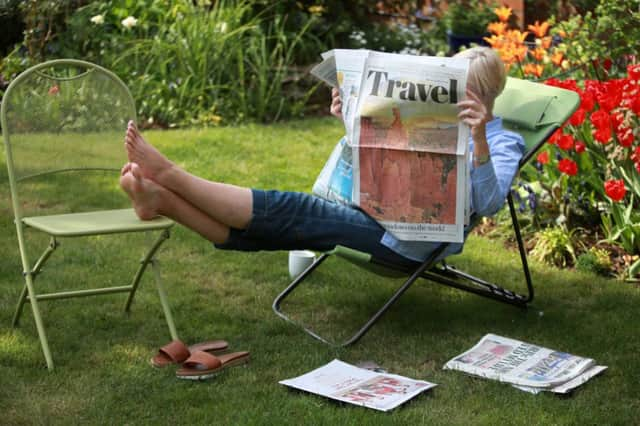Here's when tourism in the UK and abroad might start after lockdown ends


Health Secretary Matt Hancock recently indicated that the summer season for holidays abroad is very likely to be cancelled.
He told ITV's This Morning that it is "unlikely that big, lavish, international holidays are going to be possible this summer.”
Advertisement
Hide AdAdvertisement
Hide AdThe Foreign Office continues to advise against all non-essential international travel, advice which originally took effect on 17 March for a period of 30 days, but has since been extended indefinitely.
“The COVID-19 pandemic has led to unprecedented international border closures and other restrictions,” said the FCO. “All countries may restrict travel without notice.”
That indefinite ruling remains in place, even as other countries begin to relax their measures; there's no telling how things will play out.
Will my summer holiday plans happen?
The short answer to this question, regardless of where in the UK you are based, is ‘probably not’.
Advertisement
Hide AdAdvertisement
Hide AdTransport Secretary Grant Shapps recently said he would certainly not be booking a summer holiday at present.
Speaking to BBC Radio 4's Today programme in April, Mr Shapps said that "clearly people will want to see what the trajectory of this disease is in the next few weeks".
"I won't be booking a summer holiday at this point, let's put it that way."
Will I have to quarantine if I do travel?
The future is more than uncertain than ever at the moment, but it looks as though even if travel does get the go-ahead this year, you won’t be able to enjoy much of your time when you arrive at your destination.
Advertisement
Hide AdAdvertisement
Hide AdThe Government will soon require all arrivals into the UK to quarantine for a 14-day period, even if they are UK citizens.
The intention is that this will not be a requirement for arrivals from France and the Common Travel Area (Ireland, the Isle of Man and Channel Islands), although Ireland requires arrivals to quarantine for two weeks, with the exception of Northern Ireland arrivals.
But that’s just coming back; your holiday plans will likely be scuppered at the other end too, with various measures in place as other countries attempt to stop further outbreaks of Covid-19 being imported from oversees.
Spain has announced that all visitors must quarantine for 14 days on arrival, starting 15 May, putting the country's sun-kissed coastline and islands out of reach until further notice.
Advertisement
Hide AdAdvertisement
Hide AdThe Government of Iceland announced that it expects to start easing restrictions on international arrivals from 15 June, but visitors are expected to be given the choice of being tested for Covid-19 upon arrival, or otherwise proving they are free of infection.
Will there be any travel agreements?
That’s just a handful of examples, and while different countries may have different requirements and suppression measures depending on the spread of the virus in their nations, attempts at consensus across multiple countries are being made.
A gradual lifting of borders has been proposed by the EU in an attempt to restart tourist industries hit hard by the pandemic.
"Our message is we will have a tourist season this summer," said economic affairs commissioner Paolo Gentiloni, "even if it's with security measures and limitations."
Advertisement
Hide AdAdvertisement
Hide AdThe plans are non-binding, but involve countries working together to gradually remove travel bans and border checks while keeping certain measures as the outbreak comes under control across member states.
A phased approach could first allow seasonal workers across borders, followed by a lifting of restrictions between countries with the virus under a similar level of control.
Austria and Germany have become the latest EU countries to agree to remove travel restrictions. From Friday 15 May there will be random checks at border crossings; free movement is planned to resume a month later on 15 June.
Elsewhere, plans are being made to create tourism "bubbles" - allowing countries to open borders with similar coronavirus epidemiology profiles. In the Baltic states, Estonia, Lithuania and Latvia will open their borders to each other from 15 May.
What about holidaying closer to home?
Advertisement
Hide AdAdvertisement
Hide AdWith the options for international summer travel proving slimmer than ever, many will be looking to home for tourism ideas, but that might prove just as problematic this year.
Though lockdown restrictions may have lifted in England to allow unlimited travel within its borders for exercise, Wales, Scotland and Northern Ireland all still advising people keep travel local – unless for essential reasons – until further notice.
As part of Boris Johnson’s three-part plan to reopen society, hospitality venues including hotels, B&Bs and self-catering accommodation, could reopen from 4 July, providing they meet new Covid Secure Guidelines to ensure public health and safety.
However, the nation's beauty spots are cautious about welcoming a surge of holidaymakers after lockdown, with many destinations such as Cumbria, Wales and Scotland, urging visitors to stay away.
If infection rates continue to fall, it is possible that they may gradually begin to welcome visitors this summer, although this is likely to be in a controlled manner.